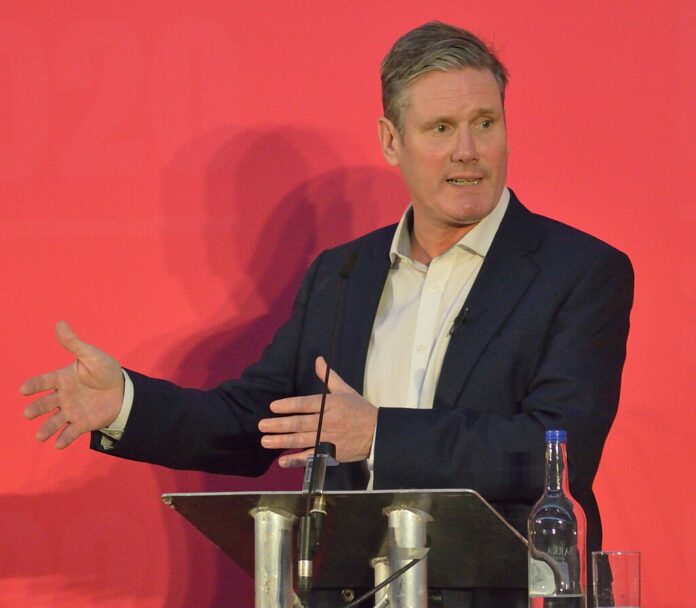Prime Minister Keir Starmer attends NATO’s 75th-anniversary summit in Washington, calling for increased defence investment amid rising global threats and launching a UK strategic defence review
In his inaugural international trip since assuming office, Prime Minister Keir Starmer has embarked on a pivotal journey to Washington for NATO’s 75th-anniversary summit. The summit serves as a platform for Starmer to reaffirm the United Kingdom’s steadfast commitment to the NATO alliance while advocating for enhanced defence spending among member states.
Starmer’s presence at the summit coincides with the unveiling of a comprehensive strategic defence review aimed at fortifying the UK’s military capabilities in response to evolving global challenges. Central to this review is a proposed increase in defense expenditure, with ambitions to raise spending to 2.5% of the UK’s GDP, up from the current 2.32%.
Embed from Getty ImagesThe prime minister’s agenda is underscored by the urgency of contemporary geopolitical threats, including Vladimir Putin’s ongoing aggression in Ukraine and the persistent instability across the Middle East. Emphasizing the critical role of NATO in addressing these challenges, Starmer will advocate for collective action among allies to bolster defence capabilities and ensure readiness against emerging threats from authoritarian regimes.
Accompanied by his wife, Victoria, Starmer is scheduled to engage in bilateral discussions with US President Joe Biden, aiming to reinforce the transatlantic partnership amid political transitions and uncertainties in both countries. The meetings are expected to highlight shared strategic interests and affirm commitments to mutual defence and security cooperation.
Amid speculation about the implications of the upcoming US elections and the potential return of former President Donald Trump, Starmer’s diplomatic manoeuvres seek to consolidate support for NATO’s mission while navigating potential shifts in American foreign policy.
During the summit, Starmer plans to underscore the UK’s unwavering support for Ukraine amidst escalating tensions with Russia, symbolized recently by Moscow’s attacks on civilian targets in Kyiv, including a children’s hospital. The prime minister is slated to hold discussions with Ukrainian President Volodymyr Zelenskiy, reinforcing solidarity with Ukraine and advocating for sustained international backing against Russian aggression.
Accompanying Starmer on this diplomatic mission are key cabinet members including David Lammy, the Foreign Secretary, and John Healey, the Defense Secretary. Their presence underscores the UK’s comprehensive approach to international security, aiming to strengthen defense partnerships within NATO and initiatives like AUKUS.
Analysis:
Political:
Politically, Starmer’s call for increased NATO defense spending aligns with broader efforts to strengthen international alliances and assert British influence in global security matters. It underscores the UK’s commitment to multilateralism and collective security in the face of geopolitical threats, thereby enhancing its diplomatic stature and strategic positioning in international affairs.
Social:
Socially, Starmer’s emphasis on defence preparedness resonates with public concerns over national security and defence capabilities. The proposed strategic defence review aims to reassure the British public of the government’s commitment to safeguarding national interests and protecting citizens from global threats, fostering a sense of security and resilience amid uncertain geopolitical landscapes.
Economic:
Economically, the strategic defence review’s focus on increasing defence spending reflects a significant financial commitment aimed at bolstering defence industries and enhancing technological capabilities. The proposed investment is expected to stimulate economic activity within the defence sector, supporting jobs and innovation while reinforcing the UK’s defence industrial base.
Technological:
Technologically, the UK’s strategic defence review seeks to modernize armed forces and enhance capabilities in response to evolving threats. Investments in advanced technologies and cybersecurity measures are pivotal to maintaining military readiness and ensuring operational effectiveness in an increasingly digitalized and complex global security environment.
Environmental:
While not directly related, the defence spending proposals could indirectly impact environmental policies through investments in sustainable defence technologies and practices. The review’s emphasis on efficiency and technological innovation may contribute to reducing the ecological footprint of defence operations, aligning with broader environmental sustainability goals.
